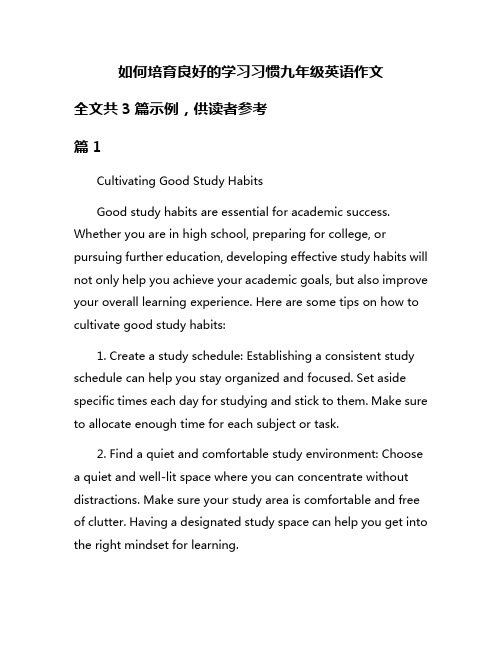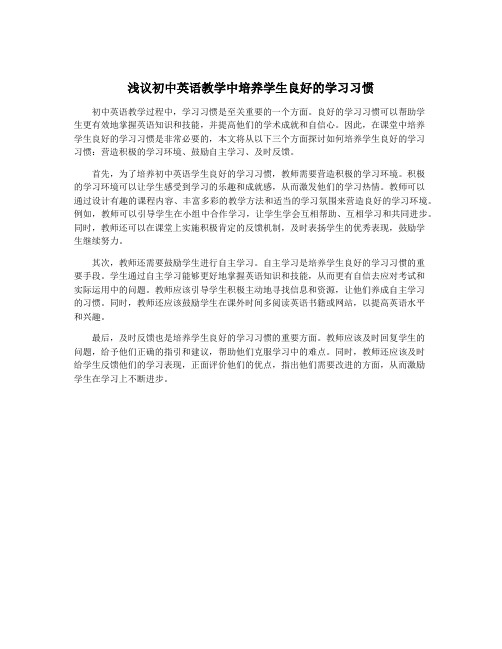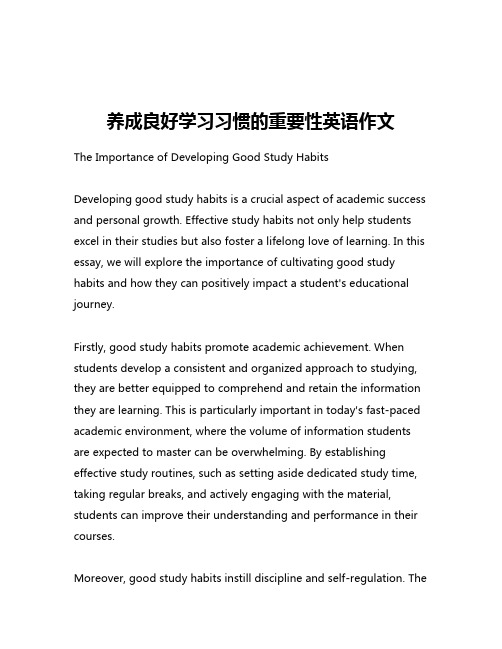初中英语教学论文 培养前置性学习的好习惯,促进学生英语学习
浅论初中生英语学习良好习惯的培养

浅论初中生英语学习习惯的培养【内容摘要】建立一种好习惯,通过教育,通过陶冶,直至终身不忘。
教师培养学生良好的学习习惯是为学生的持续发展和终身学习打下基础。
本文主要是从怎样培养英语学习习惯和英语学习习惯的主要要求两个方面进行论述。
【关键词】初中英语学习习惯培养要求前些日子看了一本叫《习惯与命运》(Habitat & Fortune)的书,受益匪浅。
文章中有一节引用了培根论习惯与命运:习惯是一种多么顽强的力量,它可以主宰人的一生。
因此,从小就应该建立一种好习惯,通过教育,通过陶冶,直至我们终身不忘。
初中阶段的英语学习还是一个起步阶段,英语中有个谚语:好的开始是成功的一半(A good beginning is half done),因此,培养中学生养成良好的学习习惯,就更为重要了。
古人云:“授人以鱼,一餐之需,授人以渔,终生受益”。
对于我校的学生来说,都是初学者,因此,在起始阶段的教学中,不要贪多求快,不要忙于多教些单词,多教些句型,多背些课文,而是多下功夫,培养学生学习英语的良好习惯。
一个学生从小是否优良好的学习的习惯,往往可以决定这个学生一生学业的成败。
英语是一门实践性很强的交际工具学科。
要掌握英语,除了需要学习一定的语音、词汇、语法知识外,还得练就扎实的听、说、读、写基本功。
换言之,英语学习必须要有大量的听、说、读、写四种技能的训练。
从这个意义上说,英语教学的过程,尤其是学生学习英语的过程,在很大程度上就是英语习惯的培养过程。
有关教学研究表明,“要学好英语,就必须掌握英语学习的基本方法,养成良好的英语学习习惯。
不少英语优秀者用自己的学习实践证明:养成良好的英语学习习惯=成功。
”“不少学生觉得学习英语费时费力且收效甚微,其主要原因是没有养成良好的学习惯。
”“有统计显示,在学习外语成功的因素中,良好习惯占30%,兴趣占25%,智力占15%.由此可见,培养学生良好的英语学习习惯是教师头等重要的工作.”英语学习习惯的培养需要老师和学生双方的共同努力。
在农村初级中学培养学生良好英语学习习惯之论文

在农村初级中学培养学生良好的英语学习习惯之浅探笔者从事农村初级中学英语教学工作二十余年,深深感受到培养学生良好英语学习习惯至关重要。
一个良好的具有个性与科学性的英语学习习惯将使学生受益终身。
那么,在教学实践活动中,笔者是如何培养学生的良好的英语学习习惯呢?
1.培养学生良好的听英语习惯。
听和说是交际活动中相辅相成的两个方面,听是说的前提条件和基础。
同时听力是英语教学中最基本最重要的一种技能,特别是在英语教学的初级阶段,更应是教学的重点。
听力也是集其他语言技能之功能的综合技能。
它要求听者不仅要掌握语音、词汇、语法、思维体系等方面的规律,还要注意语篇中存在的如语速、发音清晰度、犹豫,停顿等因素的知识。
因此,听力也与其他语言技能一样,必须经过系统的循序渐进的训练。
那么如何让学生养成良好的听力习惯呢?
1.1保持良好的心态
在听力的过程中必须注意力高度集中,‘无丝竹之乱耳’'若
其中有一个或几个听不懂的生词,或者遇到听不懂的句子,这很正常,不要紧张,赶快放弃,专心去听后面的内容。
这时,教师也不必提示学生。
听完后必须对所听到的内容进行分析、综合、推理、判断,选出与问题有关的准确信息。
1.2带着问题积极的听
在听每段对话或者独白前,抓住一切可能的机会浏览试题,以。
如何利用前置作业促进初中生英语预习习惯的培养[论文]
![如何利用前置作业促进初中生英语预习习惯的培养[论文]](https://img.taocdn.com/s3/m/981161cfbb4cf7ec4afed02b.png)
浅谈如何利用前置作业促进初中生英语预习习惯的培养摘要:前置性学习是生本教育理念的一个重要表现形式。
它是指教师向学生讲授新课内容之前,让学生先根据自己的知识水平和生活经验所进行的尝试性学习。
学生通过预习,对新知识有了初步感受和浅层理解,从而更有目的地进行课堂学习,有效地提升了课堂教学效果。
所以通过前置性作业来培养学生的预习能力是一种切实可行的方法。
关键词:前置性作业;有效形式;预习习惯一、引言目前,我校正在大力推进新一轮的课堂教学改革——“生本教育”。
它是一种全新的教育理念,它提出的教学原则是“先学后教,以学定教”。
这个理念将学生的“先学”提到了首要的位置。
“先学后教”就是通过学生先学习,确定课堂教学的起点。
我们把学生先学的内容叫做“前置性学习”。
前置性学习也叫前置性研究或前置性作业(preset-homework),是在生本教育的理念下,教师将下一节课要学习的内容以浅显纲要或要点的形式布置,这类作业是为新课做预备、做铺垫、做指引的。
它是预习作业,但又超越了预习作业。
因为它能引导学生怎样去预习,怎样做好“先学”,怎样进行知识融合。
所以,笔者认为前置性作业在培养学生自主学习、养成良好的预习习惯上有着非常重要的作用。
二、巧设形式,提高效率1.实践类作业:采访、观察记录、调查等。
在学习《新目标》教材(以下都以此教材的九年级为例)9a unit 2 i used to be araid of the dark.这个单元前我们可以设计下面的调查任务作为前置性作业:task: i have changed!■[设计说明]要完成这项前置性作业,学生必须先预习第二单元的重要语言功能项目used to的概念及正确用法;其次,学生还要对七、八年级学过的所有表示外貌、性格和爱好方面的词汇或词组做一个详尽的复习,这是一个比较大的工程。
学生需要认真去对待才能有较好的预习效果。
在做好充分准备的课堂上教师就能够真正做到把主动权还给学生,学生也才有足够的时间和机会在课堂上大胆、自信、主动地展示自己的预习成果,他们畅谈自己及朋友和家人过去和现在的变化,同时对本单元的重点used to be/ have也进行了大量的有效操练,本单元的教学重点和难点也就在学生大胆的展示和交流中迎刃而解了。
如何培育良好的学习习惯九年级英语作文

如何培育良好的学习习惯九年级英语作文全文共3篇示例,供读者参考篇1Cultivating Good Study HabitsGood study habits are essential for academic success. Whether you are in high school, preparing for college, or pursuing further education, developing effective study habits will not only help you achieve your academic goals, but also improve your overall learning experience. Here are some tips on how to cultivate good study habits:1. Create a study schedule: Establishing a consistent study schedule can help you stay organized and focused. Set aside specific times each day for studying and stick to them. Make sure to allocate enough time for each subject or task.2. Find a quiet and comfortable study environment: Choosea quiet and well-lit space where you can concentrate without distractions. Make sure your study area is comfortable and free of clutter. Having a designated study space can help you get into the right mindset for learning.3. Set specific goals: Set achievable and specific goals for each study session. Having clear objectives will help you stay motivated and focused. Break down larger tasks into smaller, manageable chunks to avoid feeling overwhelmed.4. Use active learning techniques: Instead of passively reading or listening, engage with the material actively. Take notes, ask questions, and participate in discussions. Experiment with different study techniques such as mind mapping, flashcards, or summarizing key points.5. Practice time management: Learn to prioritize tasks and manage your time effectively. Set deadlines for assignments and projects, and plan your study sessions accordingly. Avoid procrastination by breaking tasks into smaller steps and tackling them one at a time.6. Stay organized: Keep track of your assignments, notes, and study materials. Use folders, binders, or digital tools to stay organized and prevent information overload. Develop a system for managing your schoolwork and study resources.7. Take breaks: Give yourself regular breaks during study sessions to recharge and prevent burnout. Short breaks can help improve your focus and productivity. Use break time to rest, stretch, or do a quick relaxation exercise.8. Seek help when needed: Don't be afraid to ask for help if you're struggling with a subject or assignment. Reach out to teachers, tutors, classmates, or online resources for support. Don't wait until the last minute to seek assistance.9. Review and revise: Regularly review your notes, practice problems, and study materials to reinforce your learning. Make revisions based on feedback from teachers or self-assessment. Create study guides or summaries to help you review key concepts before exams.By following these tips and consistently practicing good study habits, you can improve your academic performance and become a more effective learner. Remember that developing good study habits takes time and effort, so be patient with yourself as you work towards achieving your academic goals. With dedication and perseverance, you can cultivate the habits that will set you up for success in school and beyond.篇2How to Cultivate Good Study HabitsGood study habits are essential for academic success. In order to excel in school, it is important to develop and maintaineffective study habits. Here are some tips on how to cultivate good study habits:1. Create a study schedule: It is important to set aside dedicated time each day for studying. Create a study schedule that fits your individual needs and stick to it. This will help you stay organized and ensure that you have enough time to complete your schoolwork.2. Find a quiet study space: Choose a quiet, comfortable study space where you can focus and concentrate. Make sure your study area is free from distractions such as noise, clutter, and electronic devices.3. Stay organized: Keep your study materials, notes, and assignments well-organized. Use folders, binders, and planners to keep track of important information and deadlines. This will help you stay on top of your schoolwork and avoid last-minute cramming.4. Take breaks: It is important to take regular breaks while studying to prevent burnout and improve concentration. Take a short break every 45-60 minutes to relax, stretch, and recharge before getting back to work.5. Set goals: Set specific, achievable goals for each study session. Break down larger tasks into smaller, manageable chunks and reward yourself for meeting each goal. This will help you stay motivated and focused on your studies.6. Practice good time management: Prioritize your tasks and allocate time for each subject based on its importance and difficulty. Use a timer or timer app to stay on track and avoid wasting time on unproductive activities.7. Seek help when needed: Don't hesitate to ask for help if you are struggling with a particular subject or topic. Reach out to your teachers, classmates, or tutors for assistance and guidance. Remember, it is okay to ask for help when you need it.8. Stay positive: Maintain a positive attitude towards your studies and believe in your abilities to succeed. Celebrate your achievements and learn from your mistakes. Stay motivated and determined to reach your academic goals.By following these tips, you can cultivate good study habits that will help you succeed in school and beyond. Remember, developing effective study habits takes time and effort, but the rewards are well worth it. Good luck!篇3How to Cultivate Good Study HabitsGood study habits are crucial for academic success. They not only help students to retain information more effectively, but also improve their overall performance in exams. For ninth graders, developing good study habits is particularly important as they are transitioning to high school where the workload is heavier and the expectations are higher. In this article, we will discuss some effective strategies for cultivating good study habits.1. Create a study scheduleOne of the first steps in developing good study habits is to create a study schedule. Make a list of all your subjects and allocate specific times for each subject. This will help you to stay organized and ensure that you cover all the necessary material. Stick to your schedule and try to study at the same time every day to create a routine.2. Set specific goalsSet specific, achievable goals for each study session. This will give you a sense of direction and motivation to keep going. Break down your study material into smaller chunks and set deadlines for completing each section. When you achieve yourgoals, reward yourself with a short break or a treat to stay motivated.3. Find a quiet study spaceFind a quiet, well-lit study space where you can focus and avoid distractions. This could be a designated study area at home, a library, or a quiet cafe. Make sure that your study space is comfortable and free from noise or interruptions. Keep your study area tidy and organized to create a conducive environment for learning.4. Take regular breaksIt is important to take regular breaks while studying to avoid burnout. Studies have shown that taking short breaks every25-30 minutes can help improve focus and retention. Use your breaks to stretch, relax, or grab a snack. Avoid using your breaks to check social media or watch TV, as this can disrupt your study flow.5. Use active study techniquesInstead of simply reading and highlighting your notes, use active study techniques to engage with the material. This could include summarizing key points, creating flashcards, or teaching the material to someone else. Actively engaging with thematerial can help you retain information better and improve your understanding.6. Stay organizedKeep all your study materials, notes, and assignments organized to avoid wasting time looking for information. Use folders, binders, or digital tools to keep track of your study materials. Keep a planner or a calendar to record deadlines, exams, and important dates. Being organized can help reduce stress and improve your productivity.7. Seek help when neededDon't be afraid to ask for help if you are struggling with a particular subject or topic. Reach out to your teachers, classmates, or tutors for assistance. Join study groups or online forums to discuss difficult concepts and gain new perspectives. Remember that it is okay to seek help and that asking questions is a sign of strength, not weakness.8. Practice self-careTaking care of your physical and mental well-being is essential for effective studying. Make sure to get enough sleep, exercise regularly, and eat a balanced diet. Manage your stress through relaxation techniques such as deep breathing,meditation, or yoga. Take time for yourself to recharge and relax, as a healthy mind and body are key to academic success.In conclusion, developing good study habits is a gradual process that requires dedication, consistency, and self-discipline. By following the strategies outlined above, ninth graders can cultivate effective study habits that will set them up for success in high school and beyond. Remember that everyone learns differently, so don't be afraid to experiment with different study techniques until you find what works best for you. Good luck!。
浅议初中英语教学中培养学生良好的学习习惯

浅议初中英语教学中培养学生良好的学习习惯初中英语教学过程中,学习习惯是至关重要的一个方面。
良好的学习习惯可以帮助学生更有效地掌握英语知识和技能,并提高他们的学术成就和自信心。
因此,在课堂中培养学生良好的学习习惯是非常必要的,本文将从以下三个方面探讨如何培养学生良好的学习习惯:营造积极的学习环境、鼓励自主学习、及时反馈。
首先,为了培养初中英语学生良好的学习习惯,教师需要营造积极的学习环境。
积极的学习环境可以让学生感受到学习的乐趣和成就感,从而激发他们的学习热情。
教师可以通过设计有趣的课程内容、丰富多彩的教学方法和适当的学习氛围来营造良好的学习环境。
例如,教师可以引导学生在小组中合作学习,让学生学会互相帮助、互相学习和共同进步。
同时,教师还可以在课堂上实施积极肯定的反馈机制,及时表扬学生的优秀表现,鼓励学生继续努力。
其次,教师还需要鼓励学生进行自主学习。
自主学习是培养学生良好的学习习惯的重要手段。
学生通过自主学习能够更好地掌握英语知识和技能,从而更有自信去应对考试和实际运用中的问题。
教师应该引导学生积极主动地寻找信息和资源,让他们养成自主学习的习惯。
同时,教师还应该鼓励学生在课外时间多阅读英语书籍或网站,以提高英语水平和兴趣。
最后,及时反馈也是培养学生良好的学习习惯的重要方面。
教师应该及时回复学生的问题,给予他们正确的指引和建议,帮助他们克服学习中的难点。
同时,教师还应该及时给学生反馈他们的学习表现,正面评价他们的优点,指出他们需要改进的方面,从而激励学生在学习上不断进步。
培养良好英语学习习惯,有效提高英语学习效果论文

培养良好英语学习习惯,有效提高英语学习效果学习得法,事半功倍。
“教会学生学习,这对学生来说,是一生中最有价值的本钱”。
现在,不少学生觉得学习英语费时费力且收效甚微,其主要原因是没有养成良好的学习习惯,习惯的养成是一个过程,既需要一定的时间,也需要一定的方法。
好习惯都是训练出来的,不是说教出来的。
因此,在学习习惯的培养上,只有坚持不懈地进行训练,才能取得良好的效果。
教师通过培养学生良好的学习方法,帮助学生发挥学习主动性,让学生体验成功学习的快乐,从而树立学好英语的自信心,加之教师不断改进教学方法,使学生的学习兴趣得到激活,从而达到最佳的教学效果。
因此,我认为老师要在课前预习、课堂参与、课后运用这三个环节上多下工夫。
一、培养良好的课前预习习惯课前预习是学生独立地获得知识的初步尝试。
从一开始,老师就要逐步要求学生对新课进行预习,让学生做到主动思考,努力理解,善于发现问题,有准备、有重点、有目的地听课。
1.词汇预习。
首先老师要指导学生如何听磁带跟读、模仿或根据国际音标朗读、记忆生词。
对于发音不准的生词再听磁带纠正发音。
还要求学生学会查阅字典,了解词性、词义。
2.课文预习。
课文预习的难度较大,起初只要求学生能较准确地翻译文章、了解大意,同时要能发现问题,找出疑点。
接着是能逐步记忆课文,随后能用自己的话复述文章,达到更好运用英语的目的。
3.语法预习。
老师要指导学生能结合新旧知识,让学生学会对比、分析、总结、归纳。
语法是学习句型的发展和提高,预习时老师要让学生大量接触含有要学的语法规则的语言材料,然后学会结合例句,通过自己对例句的理解,粗浅地了解语法规则。
其步骤是:观察——分析——归纳。
二、抓好课堂上的“五到”学生对新知识吸收得好不好,与课堂上的参与过程有着直接的关系。
课堂参与是一个过程,是学生从不会到会,从不适应到适应,从简单到复杂的逐步发展深化的过程。
课堂参与是学生的读、讲、练、讨论、提问、质疑的统一体;是结合讲解、板书、表演和动身、动眼、动手、动口、动脑,是全面培养学习能力的过程。
培养好的学习习惯的重要性英语作文120词

培养好的学习习惯的重要性英语作文120词The Importance of Cultivating Good Study HabitsGood study habits are essential for academic success and personal growth. Developing effective study routines and strategies can help students achieve better grades and build a strong foundation for lifelong learning. In this article, we will discuss the importance of cultivating good study habits and provide some tips on how to do so.First and foremost, good study habits help students stay organized and focused. By establishing a regular study schedule and creating a conducive study environment, students can avoid distractions and concentrate better on their tasks. This allows them to work more efficiently and effectively, leading to improved learning outcomes.Additionally, cultivating good study habits teaches students valuable skills such as time management, self-discipline, and problem-solving. These skills are transferable to other areas of life and can help students succeed in their future endeavors. By learning how to prioritize tasks, set goals, and overcome obstacles, students develop a growth mindset and a positive attitude towards learning.Furthermore, developing good study habits can enhance students' critical thinking and analytical skills. By engaging with course materials regularly and actively, students can deepen their understanding of the subject matter and make connections between different concepts. This not only improves their academic performance but also fosters intellectual curiosity and creativity.In conclusion, cultivating good study habits is crucial for academic success and personal development. By establishing effective study routines, students can improve their grades, acquire valuable skills, and develop a lifelong love of learning. It is never too late to start building good study habits, so take the time to reflect on your current study practices and make positive changes today. Your future self will thank you for it!。
养成良好学习习惯的重要性英语作文

养成良好学习习惯的重要性英语作文The Importance of Developing Good Study HabitsDeveloping good study habits is a crucial aspect of academic success and personal growth. Effective study habits not only help students excel in their studies but also foster a lifelong love of learning. In this essay, we will explore the importance of cultivating good study habits and how they can positively impact a student's educational journey.Firstly, good study habits promote academic achievement. When students develop a consistent and organized approach to studying, they are better equipped to comprehend and retain the information they are learning. This is particularly important in today's fast-paced academic environment, where the volume of information students are expected to master can be overwhelming. By establishing effective study routines, such as setting aside dedicated study time, taking regular breaks, and actively engaging with the material, students can improve their understanding and performance in their courses.Moreover, good study habits instill discipline and self-regulation. Theability to manage one's time, prioritize tasks, and stay focused on academic goals is essential for success in both educational and professional settings. When students cultivate good study habits, they are also developing valuable life skills that will serve them well beyond the classroom. These skills include time management, organization, and the ability to work independently, which are highly sought-after by employers and are crucial for navigating the complexities of the modern workforce.In addition, good study habits can foster a growth mindset. By consistently putting in the effort to understand and master new concepts, students develop a belief that their abilities are not fixed, but can be improved through hard work and dedication. This mindset is essential for overcoming challenges and setbacks, as it encourages students to view obstacles as opportunities for growth and learning, rather than as insurmountable barriers.Furthermore, good study habits can have a positive impact on a student's overall well-being. When students are able to effectively manage their academic responsibilities, they are less likely to experience stress, anxiety, and burnout. This, in turn, can lead to improved mental health, increased motivation, and a greater sense of accomplishment. By developing healthy study habits, students can maintain a balanced lifestyle, allowing them to engage in other activities and hobbies that contribute to their personal development.Additionally, good study habits can open up new educational and professional opportunities. Students who demonstrate strong study skills and a commitment to learning are often more competitive in the academic and job markets. Employers and academic institutions value individuals who have the discipline and self-directed learning abilities that come with good study habits. By cultivating these habits, students can position themselves for greater success in their future endeavors.In conclusion, the importance of developing good study habits cannot be overstated. These habits not only contribute to academic achievement but also foster essential life skills, promote a growth mindset, support overall well-being, and open up new opportunities. As students embark on their educational journeys, it is crucial that they prioritize the development of effective study habits, as these will serve them well throughout their lives. By investing the time and effort to cultivate these habits, students can unlock their full potential and pave the way for a lifetime of learning and personal growth.。
- 1、下载文档前请自行甄别文档内容的完整性,平台不提供额外的编辑、内容补充、找答案等附加服务。
- 2、"仅部分预览"的文档,不可在线预览部分如存在完整性等问题,可反馈申请退款(可完整预览的文档不适用该条件!)。
- 3、如文档侵犯您的权益,请联系客服反馈,我们会尽快为您处理(人工客服工作时间:9:00-18:30)。
培养前置性学习的好习惯,促进学生英语学习
前置性学习,又称为前置性小研究或前置性作业,是生本教育理念的一个重要表现形式。
它指的是教师向学生讲授新课内容之前,让学生先根据自己的知识水平和生活经验所进行的尝试性学习。
英语的前置性学习通常是学生自己对于将要学习的内容进行自主学习,了解所学内容,找出难点,朗读单词、课文,做好学习笔记。
前置性学习充分到位,课堂上学生才能更好地把握重难点,进而有针对性地解决问题。
因此,养成前置性学习习惯是学生有效学习的重要保障。
一个良好习惯的养成需要很长时间,也需要适当的方法,那如何培养学生良好的前置性学习的习惯,使之能够促进学生英语学习呢?
一、采取灵活多样的学习形式完成前置性学习。
1、自主学习,单独完成前置性学习任务。
对于成绩较好的学生或是学习的内容比较简单,学生完全可以依靠自己的力量自主完成学习内容。
通过学生的学习,可以对于将要学习的内容做到心中有数,在第二天的课堂上有针对性的听课,不仅提高自己的学习效率,对于自己的自学能力也会大大提高。
2、利用小组合作的方式,让学生共同进行前置性学习。
对于较难前置性学习内容,或者对于基础较差的学生可以通过小组合作的方式进行学习。
例如读出生词,朗读课文或是翻译短文,他们都可以将自己完成不了的任务拿到组内,共同解决。
在组内他们互相带动,交流合作,既培养了自学能力,也培养了合作能力,解决了不少问题。
3、利用班级交流的形式,完成前置性学习任务。
对于那些在组内也解决不了的任务,可以在课上让各组汇报,大家共同解决。
二、提供学生学习的空间,提高学生前置性学习的能力 1、前置性学习内容要明确。
繁杂的前置性学习会弄得学生晕头转向,实效性不大。
特别是刚开始阶段,前置性学习一定要明确。
学什么,老师要有明确的要求。
主要包括学生自学生词(读出正确的读音),朗读课文,初步了解课文大意,总结主要单词、短语、语法,提出不明白的问题等。
根据所学习的内容的不同,提出具体要求,让学生有针对性的完成作业。
2、前置性学习要低入并且分层次。
说老实话,一个班学生的水平是参差不齐的。
有的学生光读单词和课文都有难度。
所以前置性学习一定要低入并分层次。
在安排对话课的前置性学习中,我是这样要求的:1、背诵生词,默写在学习笔记上。
2、读三遍课文。
3、了解对话内容。
4、总结生词、短语的重要用法。
5、背诵课文。
6、仿写对话。
以上要求,1、2、3、4条课前人人要做,后面两条选做。
这样布置既有统一,又有开放,先学的内容不太多,而且还给了学生自由选择的机会,学生学起来会更主动。
3、前置性学习要适时指导
前置性学习是一种自学能力,刚开始时,有的学生不知道自己该干什么,怎么干,我就适当降低要求,明确学习内容。
有时要明确到让他们总结哪几个单词或是词组的用法。
在学生遇到困难时“该出手时就出手”,及时引导甚至教会学生一些方法。
方法一旦正确,就会事半功倍。
例如对于词法的用法,有些学生在工具书中抄下很多,但不一定都是符合要求的,再说也比一定都能记住。
这就需要知道他们有选择的总结学习内容。
在遇到困难时,鼓励他们在组内合作解决,还可以向老师寻求帮助。
有老师的指导,有同学的帮助,有独立探索,有互助合作,学生的前置性学习能力大大提高。
三、给学生展示的机会,以成功的体验激发学生前置性学习的欲望。
在前置性学习中,学生背诵了单词,朗读了课文,自学了生词,甚至拓展了相关的学习内容。
课堂上我们就要为他们创造一个展示的机会。
让学习较差的学生在组内合作的基础上
翻译课文,让学生朗读课文,然学生对于重点的单词和短语进行讲解。
还可以在小组展示的过程中适当采用竞赛的形式激发学习兴趣。
让他们明白,即使再平凡的学生,只要前置性学习中认真去做了,就有机会为小组赢得荣誉,赢得同学、老师的肯定和赞誉。
四、即使检查学生前置性作业完成情况,以激励的评价使学生坚持前置性学习。
对于学生的作业要及时检查,我一般是在上新课之前检查学生作业的完成情况。
即使再好的学习方法,如果不坚持实施,一切也会成为徒劳,所以对于作业的及时检查使学生坚持前置性学习尤为重要。
对于出色完成的同学我会大加赞扬;对于完成不到位的学生我要耐心指导;对于未完成的学生我先了解原因,然后有针对性地进行批评、指导或具体帮助;对于屡次偷懒者除了深刻教育加严厉批评外,还必须责令补完。
在作业批改时,充分的利用激励性评语激励学生认真完成作业。
当然在具体操作的过程中有些方法还不是特别成熟,但我相信,用我的耐心和恒心一定能帮助孩子养成前置性学习的好习惯,促进其英语学习,使他们受益终生。
